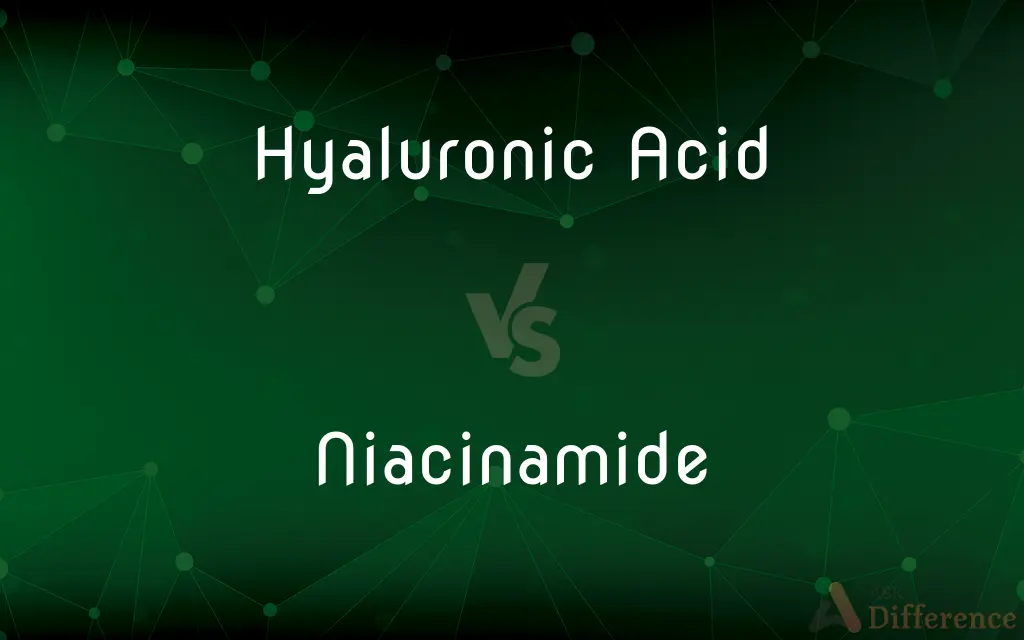Hyaluronic Acid vs. Niacinamide — What's the Difference?
By Fiza Rafique & Maham Liaqat — Published on August 26, 2024
Hyaluronic Acid is a powerful hydrator known for retaining moisture, whereas Niacinamide is celebrated for its skin-repairing and anti-inflammatory properties.

Difference Between Hyaluronic Acid and Niacinamide
Table of Contents
ADVERTISEMENT
Key Differences
Hyaluronic Acid (HA) is a naturally occurring substance in the skin known for its remarkable ability to attract and hold onto 1000x its weight in moisture. On the other hand, Niacinamide, also known as Vitamin B3, is a versatile skin care ingredient that offers a wide range of benefits.
Hyaluronic Acid plays a crucial role in maintaining skin hydration and elasticity, making it a favorite in moisturizers and serums for its plumping and hydrating effects. While Niacinamide helps to improve the skin's barrier function, reduce redness and blotchiness, minimize the appearance of pores, regulate oil production, and protect against oxidative stress.
While Hyaluronic Acid primarily focuses on hydrating the skin by drawing moisture from the environment into the skin, Niacinamide works by repairing the skin barrier, reducing inflammation, and improving skin texture and tone.
Hyaluronic Acid is generally suitable for all skin types due to its non-irritating and non-comedogenic nature. It's especially beneficial for those with dry or dehydrated skin. Niacinamide, meanwhile, is also well-tolerated by most skin types, including sensitive and acne-prone skin, due to its anti-inflammatory properties.
Both ingredients can be found in various skin care products, from serums to creams and lotions. Hyaluronic Acid is often used in products formulated for deep hydration, while Niacinamide is found in products aimed at skin repair, anti-aging, and acne treatment.
ADVERTISEMENT
Comparison Chart
Primary Benefit
Hydration
Skin repair, anti-inflammatory
Function
Retains moisture
Improves skin barrier, regulates oil
Skin Types
All, especially dry/dehydrated
All, including sensitive and acne-prone
Key Uses
Moisturizing serums and creams
Repairing treatments, anti-aging creams
Complementary With
Most skincare ingredients
Vitamin C, retinol, AHAs/BHAs
Compare with Definitions
Hyaluronic Acid
A substance that draws moisture from the environment into the skin, providing deep hydration.
Hyaluronic Acid acts as a moisture magnet, keeping the skin hydrated and plump throughout the day.
Niacinamide
Helps to visibly reduce the appearance of pores for smoother skin.
Niacinamide is known as an effective pore minimizer, giving the skin a more refined texture.
Hyaluronic Acid
Enhances the skin's appearance by reducing fine lines and wrinkles through hydration.
Regular use of Hyaluronic Acid can serve as a skin plumper, smoothing out fine lines effectively.
Niacinamide
Defends the skin against oxidative stress and free radical damage.
Niacinamide serves as an antioxidant protector, safeguarding the skin from premature aging.
Hyaluronic Acid
Maintains and improves skin elasticity by keeping it well-hydrated.
To boost skin elasticity, incorporating Hyaluronic Acid into your routine is highly recommended.
Niacinamide
Strengthens the skin's protective barrier, enhancing its defense against pollutants and irritants.
Niacinamide acts as a barrier fortifier, shielding the skin from environmental damage.
Hyaluronic Acid
A hydrating layer in skincare routines that locks in moisture.
Applying a Hyaluronic Acid serum under your moisturizer creates an effective hydration layer.
Niacinamide
Alleviates skin redness and soothes irritation.
For those struggling with redness, incorporating Niacinamide can be a game-changer.
Hyaluronic Acid
Supports the skin's healing process and reduces inflammation.
Hyaluronic Acid is often used as a healing enhancer in post-procedure care products.
Niacinamide
Balances sebum production, making it beneficial for oily and acne-prone skin.
Using Niacinamide can help regulate oil production and prevent breakouts.
Niacinamide
(organic compound) The amide of niacin.
Niacinamide
The amide of niacin (nicotinic acid), called also nicotinamide. It was at one time called vitamin B3, and can function to relieve nicotinic acid deficiency. Chemical formula C6H6N2O, chemically it is 3-pyridinecarboxamide.
Common Curiosities
Are there any side effects of using Hyaluronic Acid?
Hyaluronic Acid is generally safe for all skin types, but overuse can sometimes draw moisture out of the skin in very dry environments.
Can Hyaluronic Acid and Niacinamide be used together?
Yes, they complement each other well, with Hyaluronic Acid providing hydration and Niacinamide enhancing skin repair and barrier function.
Is Niacinamide suitable for sensitive skin?
Yes, Niacinamide is suitable for sensitive skin due to its anti-inflammatory and barrier-strengthening properties.
Is Hyaluronic Acid or Niacinamide better for dry skin?
Hyaluronic Acid is better for dry skin due to its intense hydration properties.
Is it necessary to use a moisturizer with Hyaluronic Acid?
Yes, using a moisturizer over Hyaluronic Acid can help seal in hydration and provide additional benefits.
How does Niacinamide improve skin texture?
Niacinamide improves skin texture by reducing pore size, smoothing out roughness, and strengthening the skin barrier.
Can Niacinamide help with acne?
Yes, Niacinamide can help with acne by regulating oil production and reducing inflammation.
How often should Hyaluronic Acid be used?
Hyaluronic Acid can be used daily, both morning and night, depending on your skin's needs.
Does Hyaluronic Acid help with wrinkles?
Yes, by hydrating the skin, Hyaluronic Acid can temporarily reduce the appearance of fine lines and wrinkles.
Can Niacinamide cause purging?
Niacinamide is unlikely to cause purging, as it does not increase skin cell turnover like retinoids or AHAs.
Is Hyaluronic Acid safe for acne-prone skin?
Yes, Hyaluronic Acid is non-comedogenic and safe for acne-prone skin.
Does Niacinamide lighten skin?
Niacinamide can help with skin brightening by reducing dark spots and evening out skin tone, but it does not lighten the overall skin complexion.
Is Niacinamide a good anti-aging ingredient?
Yes, Niacinamide is an effective anti-aging ingredient due to its ability to improve skin elasticity and texture, and protect against environmental damage.
Can Hyaluronic Acid be used under makeup?
Yes, Hyaluronic Acid can be used under makeup to help maintain skin hydration throughout the day.
Can Niacinamide be used in the morning?
Yes, Niacinamide can be used both in the morning and at night, but always follow up with sunscreen during the day.
Share Your Discovery

Previous Comparison
Cartilage vs. Meniscus
Next Comparison
Current Transformer vs. Voltage TransformerAuthor Spotlight
Written by
Fiza RafiqueFiza Rafique is a skilled content writer at AskDifference.com, where she meticulously refines and enhances written pieces. Drawing from her vast editorial expertise, Fiza ensures clarity, accuracy, and precision in every article. Passionate about language, she continually seeks to elevate the quality of content for readers worldwide.
Co-written by
Maham Liaqat














































